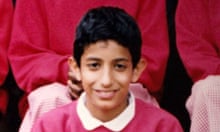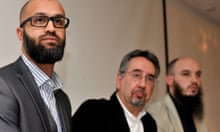Two charities have agreed to no longer fund the controversial advocacy group Cage, which has faced questions over its links to Mohammed Emwazi, the Briton identified as Islamic State killer ‘Jihadi John’.
The move made on Friday comes after pressure from the Charity Commission and follows the news that Amnesty International was also considering severing its ties with the group.
The Joseph Rowntree Charitable Trust joined the Roddick Foundation in agreeing not to give any more money to Cage, despite its initial reluctance to go that far.
“In the light of regulatory pressure, and to protect the interests of all our grantees and the other work of the trust, we have decided to publicly confirm that we will not fund Cage either now or in the future,” said a Joseph Rowntree statement.
“As a Quaker trust, we reject all violence and believe profoundly in the rights and worth of every human being. We believe that to break cycles of violence, we need due legal process for all, including those suspected or accused of terrible crimes.”
The Charity Commission said it asked both charities what money they had handed over to Cage and had requested that no more grants be awarded.
It said: “Given the nature of [Cage’s] work, and the controversy it has attracted, the Charity Commission has been concerned that such funding risked damaging public trust and confidence in charity.”
The commission said it was acting on concerns it held before the revelations relating to Emwazi and that its unease had been exacerbated by Cage’s response to media questioning over its links to the west Londoner.
In a press conference after reports that he had been identified first surfaced, Cage’s Asim Qureshi said it had been in regular contact with Emwazi in the past.
It was keen to point out the role of the British security services in his radicalisation and reluctant to directly and explicitly condemn his actions.
Speaking after it emerged that the charities had agreed to sever their ties, a Cage spokesman said they respected the decision.
Amandla Thomas-Johnson said: “We thank them for their past support. Both of these charities have played a significant role in contributing to the development of Muslim civil society here in the UK.”
He suggested that the pressure from the Charity Commission, which regulates British charities, was down to the influence of its chairman William Shawcross, who has previously been a critic of Islam as a director of the conservative Henry Jackson Society.
Thomas-Johnson said: “This is just another manifestation of their objective of pursuing a cold war on British Islam.
“Cage will remain committed to its principle of speaking truth to power and calling for accountability and transparency. We will not hesitate in performing our role as whistleblowers and as advocates for due process.”
According to the Charity Commission, the Joseph Rowntree Charitable Trust confirmed it made grant awards to Cage of £305,000 between 2007 and 2014, of which £271,250 was paid. The Roddick Foundation made grant payments of £120,000 between 2009 and 2012. The commission said Roddick responded within 24 hours and immediately agreed to cease funding Cage.
It said Joseph Rowntree initially agreed that it would make no outstanding payments on grants it had already awarded, as well as saying it had no plans to award new grants to Cage and would not award any without first consulting the commission. But, under increasing pressure, it went further on Friday, severing all ties.







